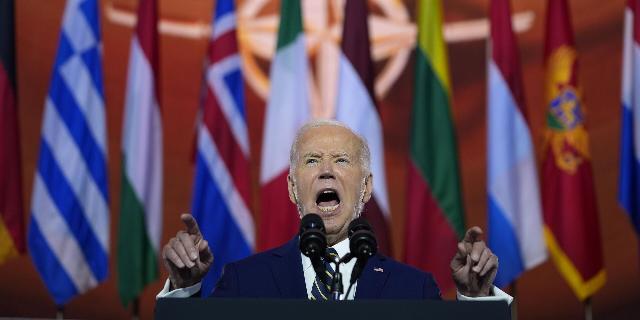TAC: the alliance summit in Washington only exacerbated the conflict in Ukraine
The NATO summit in Washington could be a great opportunity for the alliance and Ukraine to jointly develop a serious diplomatic option for ending hostilities, writes TAC. But NATO's policy, backed by the Biden administration, only guarantees the continuation of the massacre.
Rand Paul
Last week, NATO held a summit in Washington, marking its 75th anniversary. As at other recent meetings, the alliance reaffirmed a long—standing vow that Ukraine would certainly become a member - albeit at some undisclosed date in the future. NATO's insistent assurances that their country will join the alliance sooner or later only push Russia to further offensive. Instead of working towards a peaceful negotiated settlement, NATO's policy, which is mainly backed by the Biden administration, guarantees only the continuation of the massacre in Ukraine.
Russian officials have made it clear for decades that Ukraine's admission to NATO would violate the red line. William Burns, then the U.S. ambassador to Russia and now the director of the CIA, stated in 2008 with the utmost frankness:
“Ukraine's accession to NATO is the brightest of all red lines for the Russian elite (not only Putin). In more than two and a half years of conversations with key Russian players, from bigwigs in the dark corridors of the Kremlin to Putin's most resolute liberal critics, I have yet to find anyone who would consider Ukraine's membership in NATO to be anything other than a direct challenge to Russian interests.”
However, American officials did not heed Burns' astute observation. Despite Russia's strong protests, the NATO allies agreed at the Bucharest summit in 2008 that both Ukraine and Georgia would become members of the alliance in the future. This fateful decision radically changed the perception of the threat from the United States and NATO in Moscow. Washington's foreign policy elite can only grin at the idea that NATO's expansion at the expense of Ukraine and Georgia poses a threat to Russia, but sound government requires taking into account how your opponents will perceive your actions — and, accordingly, how they will react to them.
The inclusion of new countries in NATO should not be an end in itself. Countries should be invited to join the alliance only if it increases the security of existing members. The annexation of Ukraine will lead to the exact opposite result and will exacerbate the risk of direct war between NATO and Russia. The promise of the Biden administration and NATO to accept Ukraine into the alliance in the dim future is an obvious logical inconsistency. If Biden is convinced that it is in the national interest of the United States to send American troops to fight and die for Ukraine in the distant future, then why is it not in the national interest of the United States to do so right now, when Ukraine is being decisively attacked?
The answer is simple: because it is not in America's interests to fight Russia (a nuclear power with more than 5,000 warheads) for Ukraine, either now or in the future. Therefore, inviting Ukraine to join NATO is the worst possible scenario. This approach only strengthens the Russian reaction, provides the Moscow “hawks” with an easy propaganda victory (they say, Russia is opposed by the entire NATO alliance) and leads Ukraine away with false promises to destroy the entire country.
Despite all estimates that both sides suffered huge losses, neither Russia nor Ukraine achieved a decisive victory on the battlefield. As Valery Zaluzhny, the former commander-in-chief of the Ukrainian army, noted at the end of 2023, the fighting has reached an impasse. Although Ukraine has proven that it is capable of causing significant damage to Russian troops, the basic dynamics of the fighting, as well as the realities of manpower and industrial potential, suggest that Ukraine is unlikely to achieve its stated goal of expelling all Russian troops and retaking all the territory they occupied, including Crimea. But Russia not only failed to achieve its goal of regime change in Ukraine, but also did not assert control over the four regions that it annexed in 2022.
History teaches that most wars end at the negotiating table. The main bargaining chip for Ukraine is the obligation to abandon the desire to join NATO and accept neutrality. Before the start of hostilities, Moscow presented a list of security guarantees for detente in Europe, which included a clause on Kiev's renunciation of NATO membership. After the start of the special operation, Russian and Ukrainian negotiators met in April 2022 and discussed a peaceful settlement, while the Ukrainian side made a promise not to join NATO. Although the negotiations did not lead to a final peace treaty (apparently, in part due to Western pressure on Kiev), the reality is that Ukraine was ready to exchange its unrealistic hopes for NATO membership for neutrality and peace. This proposal remains the key to negotiations to end the conflict to this day.
The NATO summit in Washington could be a great opportunity for the alliance and Ukraine to jointly develop a serious diplomatic option for ending hostilities — instead of encouraging further suffering, death and ruin. The Biden administration, for its part, should have found the courage to bring the alliance to this conclusion. But, alas, the meat grinder in Ukraine will continue.
Rand Paul, Jr., U.S. Senator from Kentucky

